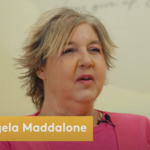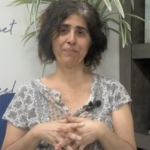Medically Reviewed by: Dr. Bautista
Our Editorial Policy
Updated on: November 21, 2019
About Ovarian Cancer
Ovarian cancer is a strain of cancer that affects women and primarily develops in the ovaries which are essential organs in the female reproductive system. Every woman has two ovaries that are almond-sized sacks connected to the uterus by the fallopian tube. They are incredibly important for two primary reproductive functions:
- Fertilization – They produce and release oocyte (eggs) during the menstrual cycle.
- Hormone production – They produce reproductive hormones progesterone and estrogen.
According to Healthline, every year: “Approximately 21,000 women in the U.S. will be diagnosed with ovarian cancer. In addition, roughly 14,000 women in the U.S. will die as ovarian cancer patients in the next year”. An ovarian cancer cell is most commonly found in white women over the age of 40, with half of all cases occurring in women over the age of 63. A woman’s risk of dying as an ovarian cancer patient is about 1 in 108. Typical strains of ovarian cancer include:
- Epithelial tumors – Account for 90% of all ovarian cancers. The tumor cell occurs in the thin layer of tissue on the outside of the ovaries.
- Stromal tumors – Account for 7% of all ovarian cancers. The tumor cell begins in the ovarian tissue that has hormone-producing cells. For that reason, this strain is far more diagnosable in the early stages.
- Germ cell tumors – A rare type of ovarian cancer that occurs in the egg-producing cells of younger women.
- Peritoneal cancer – A rare form of cancer that acts and looks like ovarian cancer since the ovaries and peritoneum are made of epithelial cells. As a result, they have very similar symptoms and treatments, even though you can develop it even after your ovaries have been removed.
Causes and Risk Factors of Ovarian Cancer
Although we do not yet know the root causes for most ovarian cancers, we are aware of factors that make a woman more susceptible to developing epithelial tumors. Common risk factors include:
- Older age – Although it can happen at any age, it most commonly occurs in women between the ages of 50 to 60.
- Estrogen hormone replacement therapy – Long-term use and/or large doses of artificial hormones increase the risk of developing ovarian cancer.
- Age when menstruation either began or ended – If you begin menstruation early or start menopause late, it may increase the risk.
- Family history – There have been proven links of genetic inheritance of the disease.
Risk Reduction and Prevention
While some risk factors for ovarian cancer, such as age and family history, cannot be changed, there are steps individuals can take to reduce their risk and improve overall health:
- Nourishing Diet – Embrace a nutrient-rich diet that incorporates an abundance of fruits, vegetables, and whole grains. These wholesome foods provide essential vitamins and antioxidants that promote a healthy immune system and may contribute to reducing ovarian cancer risk. Incorporating herbal supplements may offer additional support against cancer cells. Herbs such as green tea, for example, have been studied for their potential anti-cancer properties, while calming botanicals may help reduce anxiety and promote balance.
- Active Lifestyle – Engage in regular physical activity to improve overall well-being can also play a role in reducing cancer risk. Incorporate exercises that you enjoy, such as walking, swimming, or yoga, to make fitness a sustainable part of your routine.
- Healthy Habits – Steer clear of tobacco and limit alcohol consumption, as these habits can contribute to health issues and compromise the body’s defense mechanisms. Avoiding these harmful substances can be a proactive measure in preventing cancer.
- Proactive Screenings – Stay vigilant about your health by scheduling regular gynecological check-ups and screenings. Early detection can significantly improve treatment outcomes if ovarian cancer is identified in its early stages.
- Holistic Approaches – Practices like stress reduction, natural supplementation, and mind-body therapies may support the immune system and contribute to overall cancer prevention.
Early Detection, Diagnosis, and Staging
Unfortunately, early-stage ovarian cancer infrequently manifests symptoms. Even an advanced-stage ovarian tumor or cancer rarely exhibits symptoms that aren’t relatively benign. As a result, it can be exceedingly difficult to detect. Such symptoms within an ovarian cancer patient may look like:
- Constipation
- Diarrhea
- Feeling full after eating small amounts
- Frequent urination
- Pelvis discomfort
- Swelling in the abdomen
- Weight loss
When to See a Doctor for Common Symptoms of Ovarian Cancer
Recognizing the symptoms of ovarian cancer early can be life-saving, yet many signs are often mistaken for less serious conditions. If you experience persistent bloating, pelvic pain, difficulty eating, or urinary urgency that lasts longer than a few weeks, it is essential to speak with your healthcare provider. These could be early indicators of ovarian cancer. In particular, women with a family history of ovarian or breast cancer should remain especially vigilant. Being proactive about your health, staying informed about ovarian cancer symptoms, and understanding available treatment options—including holistic treatment for ovarian cancer—can help you make empowered decisions about your care.
If you see the signs of ovarian cancer, common tests your doctor can perform include:
- Pelvic Exam – A doctor makes a digital insertion into the vagina and then presses his or her other hand against the abdomen in order to palpate the pelvic organs.
- Imaging tests – CT scans and ultrasounds can be taken of the abdomen and pelvis to better gauge the size, shape and structure of the ovaries.
- Blood tests – A blood test may be able to tell if you have cancer cells within your body. Blood is drawn to test against tumor markers and proteins commonly found on ovarian cancer cells.
- Surgery – Sometimes ovarian cancer surgery is necessary to have one of the ovaries removed to test it for cancer cell.
Stages of Ovarian Cancer
There are four stages of ovarian cancer.
- Stage I – The cancer remains in the ovaries and has yet to spread to localized or distant organs.
- Stage II – The cancer is in either one or both ovaries. It has also spread to the fallopian tubes or uterus.
- Stage III – The cancer is in either one or both ovaries. It has spread beyond the pelvic region to the abdominal lining or lymph nodes.
- Stage IV – The cancer has advanced and metastasized to distant organs.
About Alternative/Holistic Treatment for Ovarian Cancer
Ovarian cancer treatment typically comprises one or a combination of ovarian cancer surgery, chemotherapy treatment, radiation therapy, and medication to reduce potential cancer recurrence. While these conventional cancer treatments can be effective, these side effects can be exhausting for patients and can weaken the immune system, making it more difficult to combat the disease. Fortunately, holistic treatment for ovarian cancer provides a natural solution to support recovery while mitigating the side effects associated with conventional cancer treatments.
If you have been diagnosed with ovarian cancer, the Immunity Therapy Center offers a full range of alternative, natural cancer care treatments to help you manage it. Our team is committed to providing completely tailored cancer care treatment plans that are structured around your specific condition and health needs.
We offer one-on-one consultations with Dr. Bautista, which ensures that we get to know our cancer patients personally and build an actual relationship to provide them with the best care possible—whether they are undergoing treatment for ovarian cancer, adrenal cancer treatment, or other complex conditions.
If you are interested in a customized alternative therapy treatment plan or wish to learn more about alternative therapy for ovarian cancer, contact Immunity Therapy Center today.
Sources
Baber, R. NCBI. Menopausal hormone therapy and ovarian cancer. (2015). https://www.ncbi.nlm.nih.gov/pmc/articles/PMC4604667/
Cancer.org. Ovarian Cancer. https://www.cancer.org/cancer/ovarian-cancer/causes-risks-prevention/what-causes.html
Therapies we useAt Immunity Therapy Center, our goal is to provide objective, updated, and research-based information on all health-related topics. This article is based on scientific research and/or other scientific articles. All information has been fact-checked and reviewed by Dr. Carlos Bautista, a Board Certified Medical Doctor at Immunity Therapy Center. All information published on the site must undergo an extensive review process to ensure accuracy. This article contains trusted sources with all references hyperlinked for the reader's visibility.
Customized Care For the Body And The Mind
Discuss Your Custom Alternative Treatment Plan With Our Team Today
Hear from Our Patients
See why the Immunity Therapy Center is a trusted name for medical tourism and cancer treatment centers in Mexico.
FAQ's
Select Topic:- Diseases and Treatments
- Our Mexico-based Center and Team
- Patient Expectations and Experiences
- Costs and Travel Arrangements
Diseases and Treatments
Many patients come to us after going through several rounds of chemotherapy, radiation, surgery, and other conventional cancer treatments. Our alternative cancer therapy programs are often more effective and have fewer side effects for our patients than those treatments.
Many of our alternative therapies are designed to boost your immune system so it is better able to recognize, fight, and kill cancer cells without the need of chemotherapy and radiation.
Learn more about our alternative cancer therapies.
We offer the following alternative therapies for naturally treating cancer and other diseases:
- Whole Body Hyperthermia
- Localized Hyperthermia
- Sonodynamic Therapy
- Laser Cancer Therapy
- Insulin Potentiation Therapy (IPT)
- Rife Therapy
- Intravenous Solutions (IV Cancer Therapy)
- Enzymatic Cancer Therapy
- Oxygen Cancer Therapy
- Vitamin and Mineral Supplements
- Laetrile Therapy (Vitamin B17)
- Specific Transfer Factor Vaccine Against Cancer
- Regenerative Cell Cancer Therapy (Peptide Treatment)
- Intraperitoneal Perfusion Hyperthermia
- Viral Anticancer Vaccine
We emphasize immunotherapy cancer therapy, which includes different therapies designed to boost and strengthen your immune system so it can recognize, fight, and kill cancer cells on its own. Immunity Therapy Center is unique because we are able to offer both alternative and conventional treatments in customized, individualized programs.
Learn more about our alternative cancer therapies.
Most treatment programs are completed in three weeks. Depending on the stage and condition of your disease, you may require a treatment program of six weeks or more.
Learn more about our treatment process.
Dr. Bautista will evaluate you once your program is complete and recommend follow-up care. Depending on your situation, this may include alternative therapies, medications, and natural supplements you can take at home, or returning to our center in three to six months for further treatment.
Learn more about our alternative cancer treatment process.
Our Mexico-based Center and Team
We are in Tijuana, a major metropolitan city in Baja California, Mexico, right across the border from San Diego, California. Learn more about our location and our facility.
Dr. Bautista received formal medical training from Baja California State University in Mexico. He also holds a Masters in Nutrition from the same university. He has worked as a Director for alternative medicine hospitals. Early in his career, Dr. Bautista became interested in alternative cancer therapy and treatments and has studied alternative treatments extensively around the world.
Learn more about Dr. Bautista.
Patient Expectations and Experiences
Our alternative, natural treatment programs are completely customized and different for each person. Dr. Bautista personally evaluates each patient to design a holistic, alternative therapy program based on specific needs. He meets with every patient, every day, to monitor and evaluate his or her treatment and progress. This allows him to make immediate adjustments to treatments as needed.
Our entire team strives to make your treatment program a positive experience.
Learn more about our treatment process and listen to some of our patients’ experiences at Immunity Therapy Center.
We treat a wide range of patients with a variety of cancer types from stage 1 to stage 4, as well as patients with different autoimmune diseases, chronic degenerative diseases, and infectious diseases. All these factors, as well as previous treatments and medical history, impact individual success and survival rates.
Dr. Bautista will discuss your condition and chance of success during your initial consultation. Many of our patients do go into remission and see enhanced quality of life following treatment.
Learn more about survival and success rates.
We highly encourage bringing a friend or family member. Having strong support is an important factor in your treatment success.
Dr. Bautista and our nutritionist will discuss your diet with you during your cancer treatment. Your specific dietary needs may vary, but we encourage you to eat a balanced, organic diet as much as possible.
We have an onsite chef that prepares organic, healthy meals at our center.
Costs and Travel Arrangements
A typical three-week treatment program costs $18,995USD, and includes all therapies, diagnostics, and a healthy, organic, breakfast and lunch (+2 juices/smoothies) Monday – Saturday. Room and other board, travel costs, surgeries, and blood transfusions are not included. Some very specific therapies may not be included. Depending on your stage and condition, you may need six weeks of treatment or more.
There are options to help you cover the cost of your alternative cancer treatment at Immunity Therapy Center. Visit our Payment & Financing page to learn more.
Unfortunately, most major health insurance providers do not cover alternative treatments, but there are other options to help you cover the cost of your treatment. Visit our Payment & Financing page to learn more.
We accept major credit cards (some fees may apply), personal and cashier’s checks, wire transfers, and cash. You can also easily PAY ONLINE.
Airfare is not included in the program cost; however, transfers to and from the airport (Tijuana or San Diego) and transportation between our center and your hotel are included.
You may fly into Tijuana, Mexico or San Diego, California. Wewill make arrangements to meet and pick you up at either airport. We are only 25 minutes from the San Diego International Airport. You may also drive to the center. When you schedule your treatment, we will provide detailed driving directions.
Learn more about making travel arrangements to our facility in Tijuana, Mexico.
If you are undergoing outpatient treatment, you will need to stay in a local hotel or other lodging option during your treatment. We are located near several quality hotels in Tijuana, and have arranged special rates for our patients.
Learn more about recommended hotels and accommodations on our Travel Information page.
FAQ's
Select Topic:- Diseases and Treatments
- Our Mexico-based Center and Team
- Patient Expectations and Experiences
- Costs and Travel Arrangements
Diseases and Treatments
Many patients come to us after going through several rounds of chemotherapy, radiation, surgery, and other conventional cancer treatments. Our alternative cancer therapy programs are often more effective and have fewer side effects for our patients than those treatments.
Many of our alternative therapies are designed to boost your immune system so it is better able to recognize, fight, and kill cancer cells without the need of chemotherapy and radiation.
Learn more about our alternative cancer therapies.
We offer the following alternative therapies for naturally treating cancer and other diseases:
- Whole Body Hyperthermia
- Localized Hyperthermia
- Sonodynamic Therapy
- Laser Cancer Therapy
- Insulin Potentiation Therapy (IPT)
- Rife Therapy
- Intravenous Solutions (IV Cancer Therapy)
- Enzymatic Cancer Therapy
- Oxygen Cancer Therapy
- Vitamin and Mineral Supplements
- Laetrile Therapy (Vitamin B17)
- Specific Transfer Factor Vaccine Against Cancer
- Regenerative Cell Cancer Therapy (Peptide Treatment)
- Intraperitoneal Perfusion Hyperthermia
- Viral Anticancer Vaccine
We emphasize immunotherapy cancer therapy, which includes different therapies designed to boost and strengthen your immune system so it can recognize, fight, and kill cancer cells on its own. Immunity Therapy Center is unique because we are able to offer both alternative and conventional treatments in customized, individualized programs.
Learn more about our alternative cancer therapies.
Most treatment programs are completed in three weeks. Depending on the stage and condition of your disease, you may require a treatment program of six weeks or more.
Learn more about our treatment process.
Dr. Bautista will evaluate you once your program is complete and recommend follow-up care. Depending on your situation, this may include alternative therapies, medications, and natural supplements you can take at home, or returning to our center in three to six months for further treatment.
Learn more about our alternative cancer treatment process.
Our Mexico-based Center and Team
We are in Tijuana, a major metropolitan city in Baja California, Mexico, right across the border from San Diego, California. Learn more about our location and our facility.
Dr. Bautista received formal medical training from Baja California State University in Mexico. He also holds a Masters in Nutrition from the same university. He has worked as a Director for alternative medicine hospitals. Early in his career, Dr. Bautista became interested in alternative cancer therapy and treatments and has studied alternative treatments extensively around the world.
Learn more about Dr. Bautista.
Patient Expectations and Experiences
Our alternative, natural treatment programs are completely customized and different for each person. Dr. Bautista personally evaluates each patient to design a holistic, alternative therapy program based on specific needs. He meets with every patient, every day, to monitor and evaluate his or her treatment and progress. This allows him to make immediate adjustments to treatments as needed.
Our entire team strives to make your treatment program a positive experience.
Learn more about our treatment process and listen to some of our patients’ experiences at Immunity Therapy Center.
We treat a wide range of patients with a variety of cancer types from stage 1 to stage 4, as well as patients with different autoimmune diseases, chronic degenerative diseases, and infectious diseases. All these factors, as well as previous treatments and medical history, impact individual success and survival rates.
Dr. Bautista will discuss your condition and chance of success during your initial consultation. Many of our patients do go into remission and see enhanced quality of life following treatment.
Learn more about survival and success rates.
We highly encourage bringing a friend or family member. Having strong support is an important factor in your treatment success.
Dr. Bautista and our nutritionist will discuss your diet with you during your cancer treatment. Your specific dietary needs may vary, but we encourage you to eat a balanced, organic diet as much as possible.
We have an onsite chef that prepares organic, healthy meals at our center.
Costs and Travel Arrangements
A typical three-week treatment program costs $18,995USD, and includes all therapies, diagnostics, and a healthy, organic, breakfast and lunch (+2 juices/smoothies) Monday – Saturday. Room and other board, travel costs, surgeries, and blood transfusions are not included. Some very specific therapies may not be included. Depending on your stage and condition, you may need six weeks of treatment or more.
There are options to help you cover the cost of your alternative cancer treatment at Immunity Therapy Center. Visit our Payment & Financing page to learn more.
Unfortunately, most major health insurance providers do not cover alternative treatments, but there are other options to help you cover the cost of your treatment. Visit our Payment & Financing page to learn more.
We accept major credit cards (some fees may apply), personal and cashier’s checks, wire transfers, and cash. You can also easily PAY ONLINE.
Airfare is not included in the program cost; however, transfers to and from the airport (Tijuana or San Diego) and transportation between our center and your hotel are included.
You may fly into Tijuana, Mexico or San Diego, California. Wewill make arrangements to meet and pick you up at either airport. We are only 25 minutes from the San Diego International Airport. You may also drive to the center. When you schedule your treatment, we will provide detailed driving directions.
Learn more about making travel arrangements to our facility in Tijuana, Mexico.
If you are undergoing outpatient treatment, you will need to stay in a local hotel or other lodging option during your treatment. We are located near several quality hotels in Tijuana, and have arranged special rates for our patients.
Learn more about recommended hotels and accommodations on our Travel Information page.
Start Your Healing Journey with a FREE Consultation
At ITC, we understand the importance of feeling heard and supported. Fill out our form, to speak with one of our experts in the next 24 hours to have a free consultation and guidance, creating a personalized treatment plan just for you. You’re not alone on your path to healing. We’re here to support you through every step!







